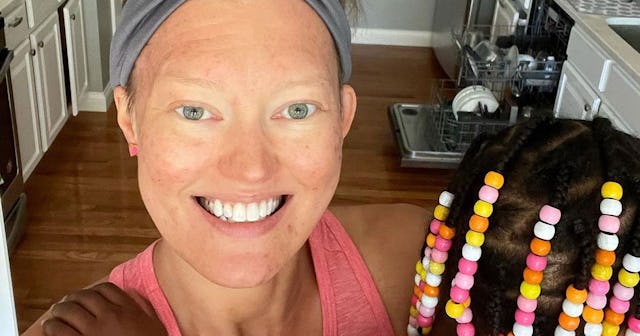I'm Not Sending My Child To Preschool This Year––For A Few Reasons

I can’t tell you the number of times that someone has asked me which preschool my child attends. When I explain that I’m homeschooling my four, almost five-year-old, I’m met with some looks. I’m used to it. As a mom of four, I’ve homeschooled my kids off and on for many years. Anyone who doubts our decision to homeschool always has the exact same first response, asking me, “But what about socialization?”
Each time we homeschooled, we did it for a different reason. I pulled on child out of public school after a two-year battle to get her help for her learning disability. I was tired of the school ignoring her needs. Another kiddo I kept home for the sake of our family schedule. This time, I’m choosing to homeschool my preschooler because I want to. Yes, you read that correctly.
My child heads to kindergarten next fall, and she will certainly be one of the oldest in her class. She misses the birthday cutoff for school this year by less than three weeks. I can’t tell you how happy I am about this. My thirteen years of parenting experience has taught me that it’s great to be an older kid in a class. They are typically more mature and more prepared for school life (academically, emotionally, and socially).
The idea of sending my child to preschool during a pandemic makes me absolutely sick. I’ve seen the pictures, and it looks downright miserable. (No hate toward the teachers who are superheroes.) I don’t want her sitting far away from her peers, wearing a mask, and dealing with constant quarantines due to positive cases, especially with the Delta variant raging. I’m all for COVID-precautions, but I do want my child to have an ideal preschool experience. At home, I can give her plenty of recesses, she doesn’t have to wear a mask, and she’s not being further exposed to the virus.
This past year has been rough for our family. I have faced my second breast cancer battle. Before I was re-diagnosed and COVID surged, I had visions of our year together. We’d play outside, run errands, and work on pre-kindergarten skills, such as writing her letters and using scissors, at her pace. However, my older kids ended up remote off and on, and I spent my days going to and from cancer treatments. It was exhausting. I was resentful of everything cancer had stolen from me, which was further compounded by the pandemic.
I want to spend this next school year pouring into my youngest. After all, she’s always had her three older siblings with us. It’s never been just her and I. I have a year left until she heads into the kindergarten classroom, and I’m determined to make it count.
I know from my years of teaching college writing and then later, homeschooling some of my other kids, that learning happens in all sorts of ways. Preschool learning isn’t just about numbers and letters, either. Physical health, mental well-being, and space to be creative and curious matter. I want to provide my child with the opportunity to gain all sorts of skills, not just academics.
Plus, my daughter is my youngest child, and we don’t plan to add to our family again. If you’re thinking, wow, it sounds like this decision is about you, you’d be partially correct. I am making this decision for the sake of my relationship with my daughter, but also because I’m qualified to homeschool her. Nor am I worried that without the traditional preschool experience, she will be missing out.
Soon enough, she’ll board a big yellow bus with her too-big backpack filled with a folder and lunchbox, and head off to kindergarten. I will be teary-eyed and nervous, just like the other parents, my mind filled with both awe and anxiety. Until then, we will be home and enjoying our time together. Homeschooling gives us the chance to go at our own pace instead of following someone else’s schedule.
Back to the socialization question, if you are among those who worry a child won’t know how to socialize because they are homeschooled, let me tell you what socialization really is. The dictionary offers this definition of socialization: “social interaction with others.” Furthermore, “the process beginning during childhood by which individuals acquire the values, habits, and attitudes of a society.” Socialization, as you can see, isn’t by-default defined as playing with same-age peers who are equally as clueless about the world.
Hear me out. True socialization actually happens when a child engages with others who are different than they are, which includes people of other ages, abilities, and cultures. Given that my child is one of four siblings, she receives plenty of socialization on a daily basis. As you can tell, I’m not concerned. Newsflash: school is hardly the only setting in which a child can learn to socialize.
I’ve ordered a few preschool level books and supplies, and I plan to read to my daughter every day. We will take walks outside, and I’ll cheer for her while she rides her bike or tries to climb a tree. If you’re thinking I sound like a total hippie, cool. I’m going to try my best to make sure her last preschool year is one of fun and freedom—one we can both always remember.
This article was originally published on